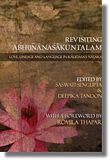Revisiting Abhijnanasakuntalam
Sengupta, Saswati [u.a.] [Hrsg.]:
Revisiting Abhijñānaśākuntalam : love, lineage and language in Kālidāsa's nāṭaka / ed. by Saswati Sengupta and Deepika Tandon. Foreword by Romila Thapar. — New Delhi : Orient BlackSwan, 2011. - xx, 328p. : ill.
ISBN 978-81-250-4419-2
Rs. 695,00
US$ 40,00 (Vedams Books)
DDC: 891.22
Beschreibung
Kālidāsa’s Abhijñānaśākuntalam has an iconic status in the history of Indian literatures. It is a tale of love found, forgotten and restored between Duṣyanta, the hero king, and Śākuntalā, an innocent maiden.
Bringing together linguists, literary critics, historians, Indologists and Sanskritists, Revisiting Abhijñānaśākuntalam analyses the play as more than just a figment of imagination—as a rich terrain for exploring links between culture, history and politics, as an interplay of memory, desire and languages. Divided into three sections, it focuses on the continuity as well as the change in the narrative of Śākuntalā, locating it in contexts of class, caste, gender, patriarchy and monarchy.
The first section, ‘The Biography of a Narrative’, addresses the earliest appearance of the narrative in the epic Mahābhārata, its best known form Abhijñānaśākuntalam as nāÔaka, and William Jones’ Orientalist interpretation of the play. It also critically examines the varied representations of the play in diverse forms such as art, theatre and cinema.
Contrary to popular perception today that Śākuntalā is the central protagonist of Abhijñānaśākuntalam, the second section, ‘The Hero King’, addresses how and why Duṣyanta is posited as the hero. It examines the representation of the king as the ideal in literature and its material reality in the context of the Gupta Period, the construction of kingship in different genres, and the politics of a courtly culture and patronage within which the articulation of the heroic king takes place.
The control of the womb is central to the reproduction of feudal and caste patriarchies. The third section, ‘Of Love, Marriage and Family’, deconstructs the politics of romantic love, marriage and motherhood in the play. The strategies of surveillance, regulation and control of sexuality by state and society as deployed in it are the focus of this section. The book thus looks into how the transactions within the play, whether dealing in love or land, through different languages, mark not only hierarchies of gender, caste and status, but also of spheres of influence and of knowledge. [Verlagsinformation]
Herausgeber
SASWATI SENGUPTA is Associate Professor, Department of English, Miranda House, University of Delhi. Faculty page.
DEEPIKA TANDON is Associate Professor, Department of English, Miranda House, University of Delhi. Faculty page.
Quellen: Orient BlackSwan; Vedams Books
Ähnlich
- Leclère: Le théâtre de l'Inde médiévale entre tradition et innovation
- Fritze: Meisterdichtungen Indiens
- Dutavakya
- Little Clay Cart
- Knutson: Into the Twilight of Sanskrit Court Poetry
- Patel: Text to Tradition
- Sivasvamin's Kapphinabhyudaya
- Illustrated Rajatarangini
- The Conquest of Madhurā
- Menon: The Performance of Nationalism

